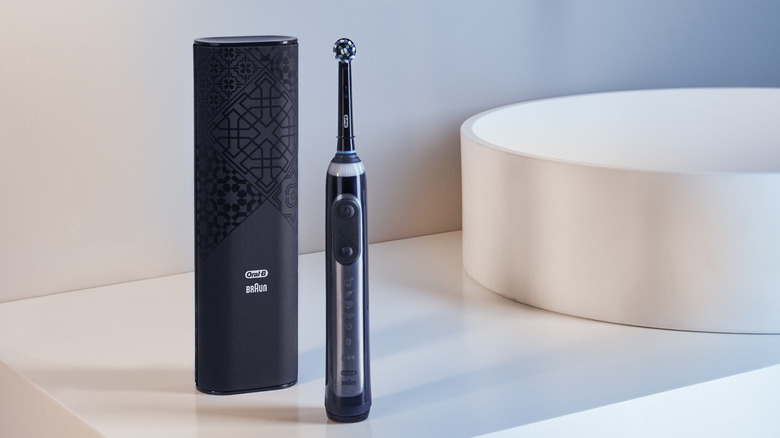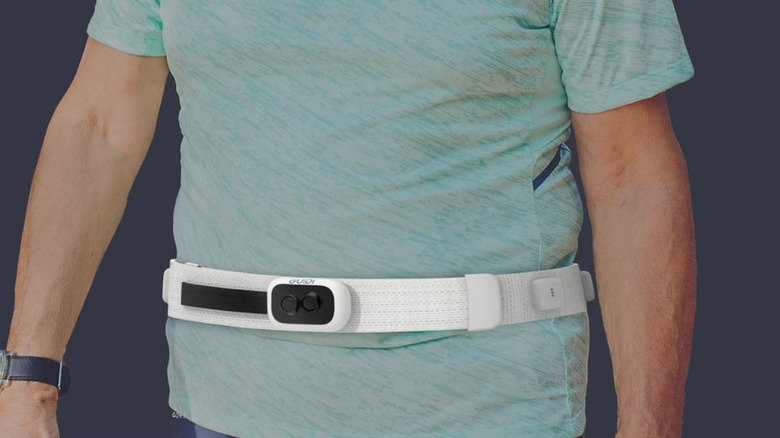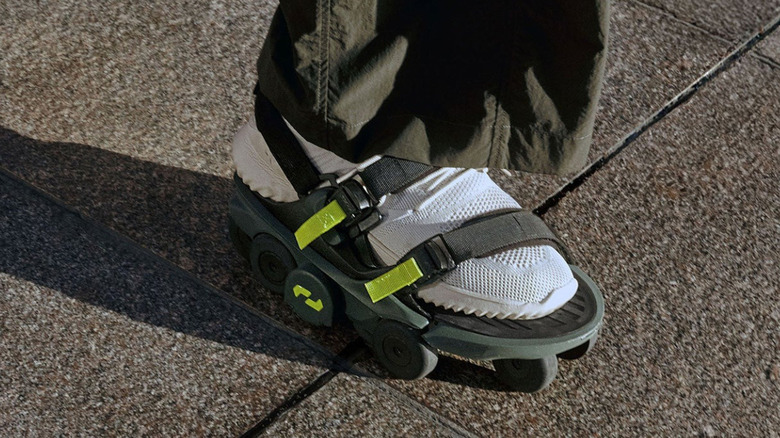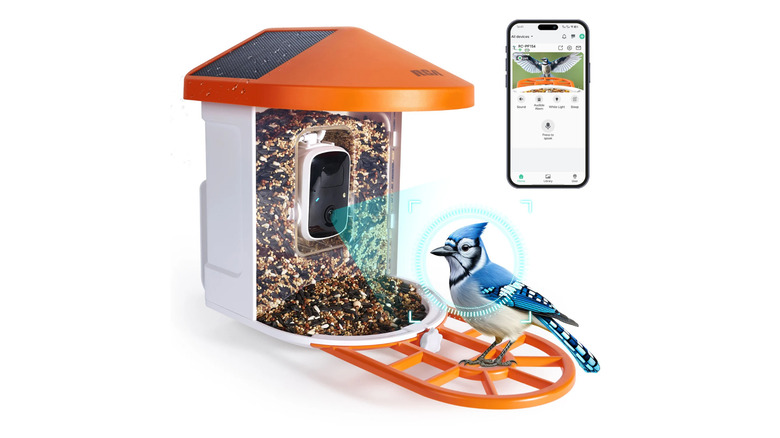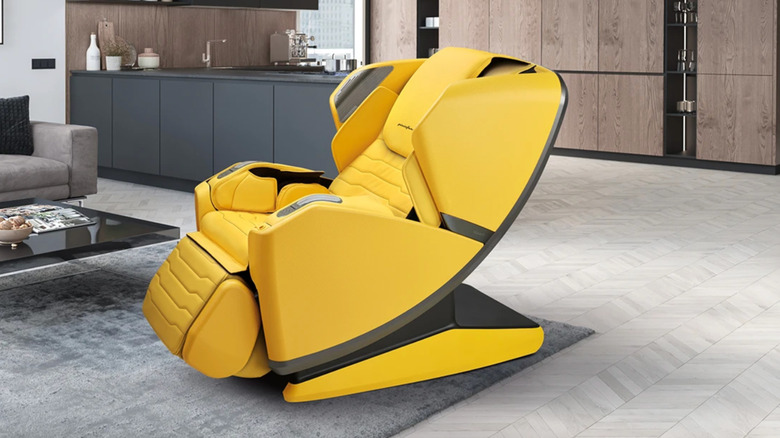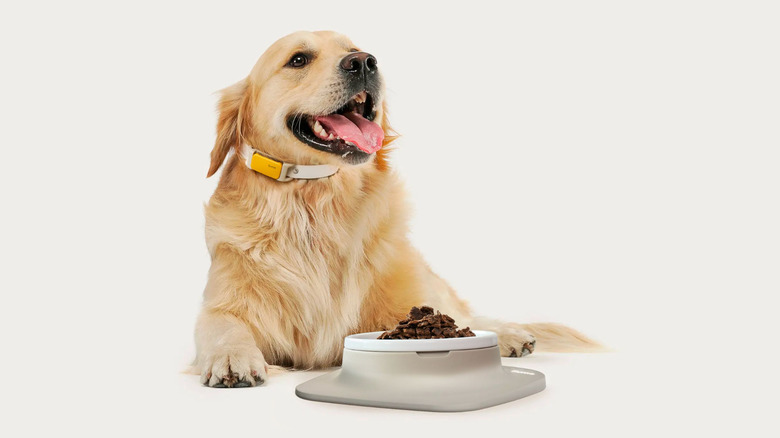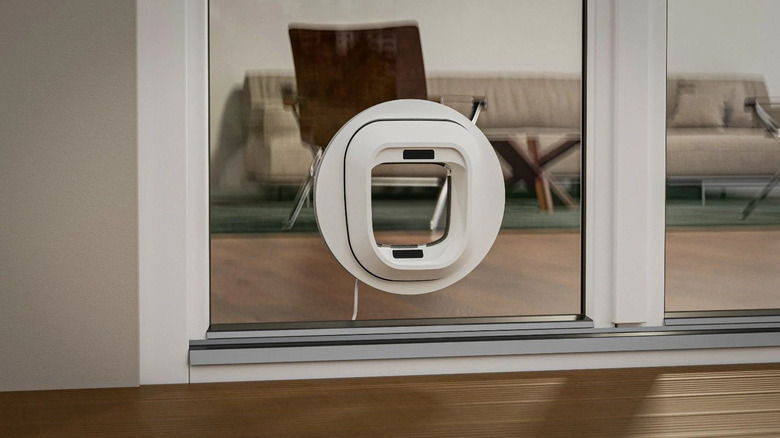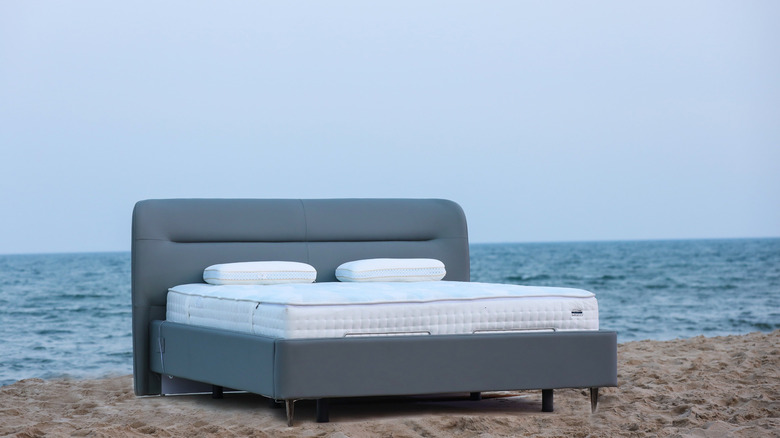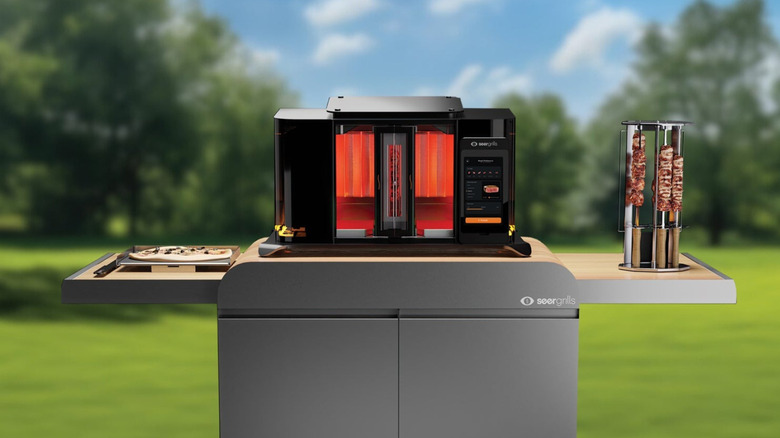10 Of The Strangest AI-Powered Gadgets You Didn't Know Existed
The most notable tech trend of 2024 has been the infusion of artificial intelligence tools into the mainstream, at both hardware and software levels. Google wants its Gemini AI to handle your emails, while Apple wants you to look and make sense of the world by using Visual Intelligence on the iPhone. Not all attempts have been well received, so far.
The Humane AI Pin, a brainchild of Apple veterans, failed to make a splash, despite blending an AI-first voice-driven user interface and a cool laser projector doubling as a screen on your palms. The story of the Rabbit R1 hasn't been particularly inspiring either. A few others, like the Plaud Note Pin, are trying to solve a niche problem.
Yet, there is no shortage of companies trying to shoehorn AI into mainstream products. Some of the attempts are rather ingenious, but a few elicit confused chuckles. In the past couple of years, and especially in the wake of the generative AI revolution, we have seen some rather astounding AI-charged products.
What follows is a list of those kinds of unexpected offerings — you may find yourself wondering why such pointless products exist, or realizing these are the gadgets you've always needed.
A toothbrush with a teaching streak
Probably the last item you'd want to feature sophisticated electronic circuitry and AI shenanigans is the humble toothbrush, something you put in your mouth on a daily basis — twice a day, even. And yet, American oral hygiene giant Oral-B has created the Oral-B Genius X electric toothbrush. This one already comes with a handful of innovative features, such as gum pressure control, half a dozen cleaning modes tailor-made for whitening and sensitive teeth, style tracking in a mobile app, and more.
So, where does AI fit into the picture? Well, Oral-B has fitted motion sensors inside the Genius X toothbrush which recognize the amount of pressure you exert as well as the orientation. Next, all the data collected by these sensors is passed through a custom algorithm that has been trained on thousands of human brushing sessions. This algorithm deduces your unique brushing style, which Oral-B says is "almost like a thumb print" for each person.
After all the data crunching, the companion mobile app offers personalized recommendations and suggestions. For example, it will tell if you leave certain areas of the oral cavity, or use the brush in the wrong orientation. The app will monitor the activity in real time and provide the necessary feedback regarding the pressure, time, location, and orientation of your brush. Now, that's some serious AI firepower, deployed solely to keep your pearly whites healthy and shiny.
An exploration belt for visually impaired
The rise of AI healthcare has brought a lot of advancement in accessibility in the past few years. Guidi is one of the standout products to come out of this trend. This AI-powered micro-electromechanical system (MEMS) smart belt is aimed at helping people living with visual impairments navigate the world around them. Equipped with a couple of 8-megapixel wide-angle cameras with a 160-degree field of view, an AI sensing module, haptic hardware, and a voice input kit, this belt brings the best of AI vision tech.
The belt scans your surroundings with its onboard lidar/radar sensor assembly, and senses obstacles (as well as people) as you moves. The AI vision stack powering the Guidi belt is capable of identifying over 50 types of objects and accordingly provides haptic feedback. A notable element of the path planning system is that it doesn't need GPS or Wi-Fi to assist the person wearing this unique belt. For path guidance, the haptic sensors provide directional vibration feedback, helping a person move around while avoiding obstacles.
For navigation, this belt relies on edge computing to perform real-time computation and provide the necessary guidance. Notably, it can work independently, thanks to a battery pack that lasts over 10 hours on a single charge. The buttons fitted on the belt feature Braille imprints for added convenience. Guidi takes an entirely hands-free approach to assistive navigational guidance and doesn't produce any noise either. The companion NAVi app also offers path-finding systems that will help users reach their destination.
Skate shoes that learn from your walk
AI has become a critical component of modern navigation and assistive driving systems — just look at Tesla's autopilot system, for example. But what if some of that convenience trickled down to our shoes? If you've been harboring such dreams, the Moonwalkers could be just the right pair of sandals for you. This "sandal on wheels" footwear relies on AI to learn how you like to move around (and on what kind of surfaces), while also taking into account your weight, and accordingly makes adjustments to offer the most comfortable rolling experience. Shift Robotics, the company behind the Moonwalkers calls it a "gait-based" AI system.
Equipped with eight powered wheels, these specialized sandals can handle 400W of power and deliver 7.3 lb-ft of torque. Those are not exactly speedster figures, but the focus here is on traction and comfort. The company claims that these sandals ape your natural walking posture and accelerate based on the amount of downward pressure applied, or the stride length. Basically, it gives you a little speed boost as you push off with each step.
There's also a USB Type-C port onboard, which allows fast charging and will fill up the IP54-protected battery pack to roughly 60% capacity in merely half an hour.
A chatty AI doll for the elderly
AI companions are quite the rage these days. From romantic partners to emotional support, people are using platforms like Replika and Nomi to find company in digital AI characters, powered by large language models. Korea-based AI healthcare company Hyodol has given its attempt at an AI companion the form of a doll with a "7 year old grandchild" character and appearance. The whole premise is eery, and rather dystopian, but Hyodol has a humanitarian objective. The device is meant to give AI-mediated eldercare a friendly face.
Aside from Korea, the doll has also found a place at care institutions in New York and the Netherlands. The company also claims that it also reduced depression among high-risk elderly folks.
At the heart of the doll is OpenAI's ChatGPT conversational bot, which has now found a place coexisting alongside Siri on iPhones. According to the product page, the Hyodol doll will talk in the cutesy voice of a grandchild and ask questions regarding the well-being of its elderly guardian. Armed with a 4G LTE connectivity stack and VoIP voice calling facilities, the doll also offers health monitoring and wellness sensing capabilities. It also acts cute when touched or patted on its head.
Aside from emotional comfort, the company says the doll can provide cognitive assistance (by playing music, quizzes, etc.) while also letting family members schedule visits remotely. It also serves as a communication channel for healthcare workers to enquire about general well-being, and for the elderly to reach out to support staff.
A feeder with bird identification superpowers
One doesn't usually squeeze bird feeders in the same conversation as machine vision. Yet, RCA Smart has managed to pull that off with its Smart Bird Feeder, which relies on what the company describes as AI Bird Recognition. The device is apparently capable of recognizing thousands of birds. When the onboard wide-angle camera (with a 145-degree field of view) and the infrared sensing kit recognize a bird perched on the feeder, it automatically starts recording an HD video of it.
The videos can either be saved locally or sent to the cloud. The companion allows users to not only play videos, but also share them with their friends and family members with ease. This AI-assisted bird feeder can handle dust and water exposure with ease, and the solar panels on the top allow it to operate without any battery shenanigans.
RCA Smart's AI bird feeder is a neat idea that adds a touch of convenience to a common hobby. However, if you don't have the space to install a bird feeder and would rather prefer to sight them naturally, there are apps out there that will help you. One such option is the Merlin Bird ID app by the Cornell Lab of Ornithology. This one can not only identify birds based on their physical characteristics but can also recognize them based on their unique chirping sounds.
A massage chair that can sense your stress
Over the past few years, stress monitoring and assessment have even made their way to wearable devices in various form factors. New York-based Osim is bringing that convenience to the luxurious comfort of a massage chair, with some help from AI. Take for example the uLove 3 Well-Being Chair. Designed by the folks over at Pininfarina, one of the biggest draws of this chair is the AI stress analysis system.
Equipped with biosensors, including one that performs electrocardiogram (ECG) analysis, this chair measures the heart rate, variability (HRV), as well as respiration rate, and then passes the data through custom AI-driven biosensing algorithms to calculate a Body Tension Score. The body tension scores are separated across five levels, ranging from low to very high. Down the road, the company aims to further refine the body stress evaluation by using machine learning techniques.
The Osim uLove 3 Well-Being Chair also comes with a bespoke speaker system that offers a spatial 3D surround sound effect. Other facilities available on the chair include hand roller balls, shoulder detection, arm airbag massage, body warmth system, calf kneading and feet rollers, and a convertible leg massager. Moreover, the companion app offers massage programs tailored to the specific needs of users, covering different body parts as well as requirements like post-stretch relaxation, beauty, recovery, and sleeping. The chair even has space for a stand to mount tablets for video watching, and a separate USB charging hardware, too.
A smart dog bowl to keep your pet in best shape
Earlier this year, folks over at the University of Michigan gathered the barking signatures of over seven dozen dog breeds, fed them into a machine learning algorithm, and created an AI model capable of understanding what different sounds meant. Now start-ups are even making digital collars that rely on AI to interpret what your dog's bark may mean. But Ilume is applying AI to pet ownership in a different way.
Say hello to the Ilume Smart Bowl, which works in tandem with a tracker and a home hub to identify activity patterns and help create a tailored nutrition plan.
The key selling point here is that the smart bowl helps owners determine the right portions for meals every time. Depending on the time of the day and activity patterns, the amount recommended is dynamically updated on a daily basis. The AI is claimed to learn from the daily movement patterns of a dog and accordingly recommend the nutritional content that should be served.
These recommendations take into account what exactly a dog needs. Whether it's a weight loss journey or simply a healthy aging course, the companion app will help users create and chalk the right dietary course for their dog. When putting the meal in the smart bowl, users don't have to deal with numerical mass figures. Instead, the radial indicator will help them easily gauge the right portion size.
An intelligent cat door that blocks prey gifts
Cats are notorious for bringing unwanted catches and animal buddies into homes. It can be a cute nuisance once in a while, but feline companions can bring in some truly filthy stuff if left unsupervised. Swiss company Flappie wants to solve that conundrum in a rather tech-savvy fashion. The Flappie Door is an AI-controlled cat flap that can detect when a cat's entry is also accompanied by uninvited guests like mice, birds, fish, snakes, or any other kind of prey.
The company claims the cat door will stay shut whenever your cat approaches with a catch in its mouth, only opening when it is dropped. Armed with a motion sensor and a night vision camera, Flappie's pet detection algorithm is continuously improving to ensure that it identifies prey with high accuracy and doesn't generate a ton of false positives.
It doesn't matter how many cats you share your home with, the AI-powered flap will check each one's entry and do its job. Users can also choose to set a schedule for letting their cats out. The companion mobile app also allows users to access videos and photos detailing their cat's activity. Another neat perk is that Wi-Fi connectivity is not mandatory for the Flappie cat door to work, but if you'd like the remote monitoring facility on your phone, an active wireless channel for data transmission is needed.
A smart mattress and anti-snoring pillow for best sleep
Every mainstream player in the consumer health wearable segment pays special attention to sleep tracking, offering detailed insights into a person's shut-eye time. However, these wearables don't really solve issues with posture or sleeping positions that can exacerbate an existing problem. DeRucci takes a holistic approach here with its smart mattress and pillow.
The DeRucci T1 Pro comes equipped with no less than 23 "flexible sleep/health AI sensors" to monitor a person's sleeping posture, changes in position, heart rate, and body temperature among other important sleep variables. Based on the sleep activity, body shape, and posture, a set of 18 flexible support airbags fitted inside the mattress, guided accompanying AI algorithms, make the necessary adjustments to ensure an optimal sleeping experience.
Those support airbags rely on piezoelectric ceramic sensors that are tightly integrated with support elements like springs, latex, and foam. Depending on the person's sleep pattern, the height and surface firmness are automatically adjusted. To go with its smart mattress, DeRucci also offers an intelligent pillow that dynamically changes its height to ensure that users don't wake up with neck fatigue due to bad sleeping posture. More importantly, clinical trials have established that these position adjustments help reduce snoring by up to 89% while sleeping.
An AI-powered grill to beat the real chefs
Grilling is no easy chore, but a dash of AI can ease almost any hassle, including the savory task of grilling up a platter. Seer Grills offers just that in the form of Perfecta, claimed to be the world's first AI-powered grill. The company has even picked up a rather fitting name for its one-of-a-kind kitchen appliance system and markets it as NeuralFire tech, an unexpected blend of dual-side infrared burners, sensors, and AI algorithms.
The idea here is to let users cook the perfect delicacy without having to worry about the intricacies of cooking. All you have to do is load up the raw material and then specify details like the meat cut, doneness level, and sear intensity. The onboard AI algorithms will handle the rest, from pre-heating to cooking and cooldown, if required. There are multiple benefits of Perfecta's unique architecture.
To start, the company claims it is up to 10 times faster than a regular cooking appliance, helping reduce the cooking time by as much as 90%, for everything from a ribeye steak to a pizza. Moreover, the double-sided cooking format ensures that users don't even have to worry about flipping. Seer Grills's appliance also offers a Chef Mode that takes over the entire process of cooking, especially the burners, to deliver exactly what users want out of their culinary adventure, without running into the usual risks like over-searing or undercooking.

